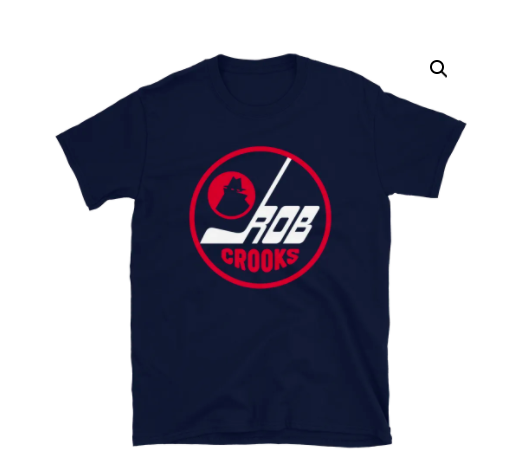
You can buy this t-shirt that was designed by 319 Heads. As you may be able to tell, the logo is derived from the Winnipeg Jets’ old logo, from the team’s first incarnation. Winnipeg has a complicated history with the NHL. Like many people around my age, I grew up watching the Jets. Some of my fondest memories of bonding with my late father were sitting in the upperdeck at Jets’ games. Growing up, names like Dale Hawerchuck were legendary in the city, and I was old enough to remember the excitement that ignited the city during Teemu Selanne’s rookie season.
When the Jets left the city in 1996 and moved to Phoenix, the city suffered a palpable identity-crisis. I wrote a song about it, and my friend Mike Maryniuk and his collaborator Matthew Ranking made a film about it. Winnipeg is a small city, made even smaller by the large swaths of sparsely populated land that surrounds it. But one thing that made us feel like a real city, and not another Regina (god forbid), was our big-league hockey team. Sure, they never made it past the first round of the playoffs, but the Wayne Gretzkys of the world still had to come to Winnipeg for all the world to see.
Eventually, most people my age moved on. Hockey was no longer central to our lives, partly because the Jets had left and partly because we had developed other interests. The city’s arts scene in particular started to thrive as more room was made for other forms of culture in the absence of the dominating NHL hockey team. After a while, things seemed fine without hockey.
When it was announced that the NHL was coming back to Winnipeg, however, the city, or a least a part of it, rejoiced. Admittedly, I didn’t really care that much at first, but when the Jets started to compete, penetrating deep into the playoffs, I was glued to the TV for every second of it. Many people from the arts community shunned hockey and anything associated with the Jets, drawing a clear line between hockey and the arts. Many saw the return of the Jets as a direct threat to the funding that local arts scene had been enjoying in the team’s absence. Personally, though, I saw little difference between arts and sports. They are both aspects of culture, and both depend on funding from equally problematic sources.
The internal culture of hockey, however, is hard to ignore. Whereas my dad could afford to take me to a game once or twice a year in the old arena, the costs associated with the new Jets was in a whole other realm. A couple of times I shelled out a hundred bucks just to sit with my back against the wall in the very last row of the MTS Centre. On my way to the game, I would tell myself I wasn’t going to stand for the anthem, but under the hard stares of the ultrapatriotic hockey fans, I would always give in. It was a small victory to keep my hat on and not shout “True North” with the other fifteen thousand people in attendance. The last time I went to a game, I intentionally went late to avoid the over-effusive nationalist carnival.
The Winnipeg Jets are owned by the son of a Winnipeg car dealership owner, Mark Chipman, and Toronto-based real estate billionaire, David Thomson, under the name True North Sports Entertainment. True North is also involved heavily with real-estate development in Winnipeg’s downtown and has ties to CentreVenture. The latter organization was created to serve as a go-between for the private sector and city hall, to guide the planning of downtown “revitalization” in favour of the rich, and funnel public money into the pockets of private investors. All of this while continuing the city’s ongoing dispossession of land from indigenous peoples, making life harder for poor people, and ignoring the fact that downtown was already very much alive – just not with people who could afford Jets tickets.
The fact that the Jets are owned by people whose only motivation is profit, at the expense of people and community, should not be surprising to anybody. The same is the case for any team in the NHL, NBA, MLB and NFL, perhaps with the exception of the Green Bay Packers (who are community-owned, though I’m not entirely sure what that entails). The fact is, even our minor league teams, the Blue Bombers and Goldeyes, are owned by the same caliber of people. Does this mean that we can’t enjoy watching sports? I don’t think that’s what it means. But it does mean we need to be aware of these realities and be careful of how far we are willing to go to support our favourite teams.
When hockey returns, I’m going to continue watching the Jets. And I’ll continue to go to rallies and protests that oppose the Jets’ owners. We can do both. But I also know that if the choice between hockey and affordable housing was up to me, the choice would be obvious. Fuck True North. That being said, I pray for a day when we don’t have to choose, when we can have both.